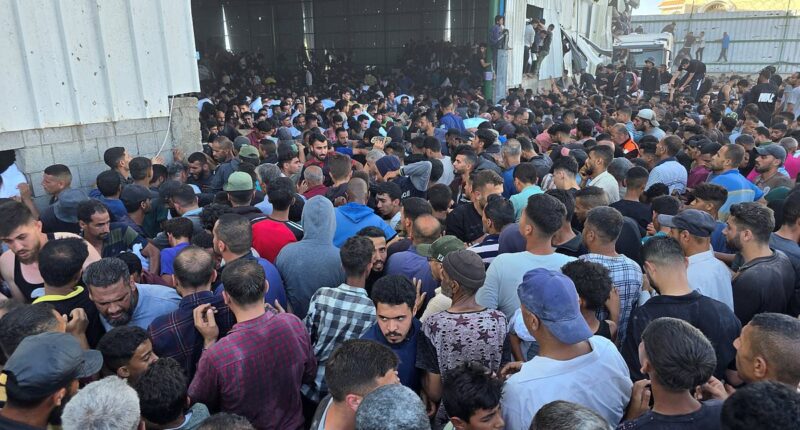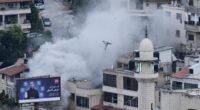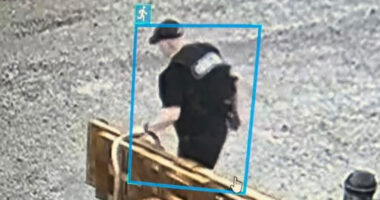
At least four people died in Gaza as hundreds of aid-starved Palestinians broke into a United Nations food warehouse yesterday in a desperate attempt to get something to eat.
Two people were crushed to death as the heaving mass of humanity poured into the Al-Ghafari warehouse housing supplies provided by the UN’s World Food Programme (WFP), while two others were reportedly shot dead.
Heartbreaking footage of the crush showed frenzied Gazans tearing pieces off the building located in Deir Al-Balah in an attempt to get at the supplies inside.
Gunshots were clearly heard ringing out in the clip, though it is not clear who fired on the group.
The humanitarian situation in Gaza, where aid has finally begun to trickle in after a two-month blockade, is dire following more than 18 months of devastating war.
Food security experts say starvation is looming for one in five people after Israel enacted a months-long blockade on aid destined for the demolished Strip.
The deaths on Wednesday came a day after Israeli soldiers opened fire on a crowd that was overrunning a new aid-distribution site set up by the Gaza Humanitarian Foundation (GHF), an Israeli and US-backed initiative.
At least one Palestinian was killed and 48 people injured, according to the Hamas-run Gaza Health Ministry.
The Israeli military, which guards the site from a distance, said it fired only warning shots to control the situation, while the foundation said its private security contractors did not open fire.
Israel and the UN are now locked in a battle over aid distribution, with each party accusing the other of preventing Gazans from accessing sorely needed supplies.
Israel had prevented all international aid from entering Gaza for 11 weeks in a move that was condemned worldwide.
Earlier this month the authorities ended the blockade to allow ‘a basic amount of food’ to enter the embattled territory, but this was described by one UN envoy as ‘a lifeboat after the ship has sunk’.
Now, however, Israel is bypassing the UN and international NGOs to provide aid via the GHF, with Israeli soldiers and private security contractors policing its stockpile and distribution.
Israeli officials said one of the advantages of the new aid system is the opportunity to screen recipients to exclude anyone found to be connected with Hamas.
Humanitarian groups briefed on the foundation’s plans say anyone accessing aid will have to submit to facial recognition technology that many Palestinians fear will end up in Israeli hands to be used to track and potentially target them.
Details of exactly how the system will operate have not been made public, but the UN has condemned Israel for blocking international aid while selectively doling out its own supplies and has refused to coordinate with the GHF.
Stephane Dujarric, spokesman for UN Secretary-General Antonio Guterres, said this week: ‘We will not participate in operations that do not meet our humanitarian principles.’
Christian Cardon, chief spokesperson of the International Committee of the Red Cross, added: ‘Humanitarian assistance must not be politicised or militarised.’
As the war in Gaza entered its 600th day Wednesday, Israeli Prime Minister Benjamin Netanyahu said his military’s offensive in the Strip ‘changed the face of the Middle East’.
He said it had killed tens of thousands of militants including Mohammed Sinwar, Hamas’ presumed Gaza leader and the brother of slain chief Yahya – mastermind of the October 2023 attacks that sparked the war.
Israeli media said Sinwar was targeted by strikes in southern Gaza earlier this month. His brother was killed in October 2024.
In Washington, US envoy Steve Witkoff expressed optimism about a possible ceasefire, saying he expected to propose a plan soon.
‘I have some very good feelings about getting to a temporary ceasefire, and a long-term resolution, a peaceful resolution of that conflict,’ he said.
But Gazans remained pessimistic.
‘Six hundred days have passed and nothing has changed. Death continues, and Israeli bombing does not stop,’ Bassam Daloul, 40, told an AFP reporter.
‘Even hoping for a ceasefire feels like a dream and a nightmare.’
Israel stepped up its military offensive earlier this month, while mediators push for a still elusive ceasefire.
In Tel Aviv, hundreds of people called for a ceasefire, lining roads at 6:29 am – the exact time the unprecedented October 7 attack began.
Relatives of hostages held since that attack also gathered in Tel Aviv.
‘I want you to know that when Israel blows up deals, it does so on the heads of the hostages,’ said Arbel Yehud, who was freed from Gaza captivity in January.
‘Their conditions immediately worsen, food diminishes, pressure increases, and bombings and military actions do not save them, they endanger their lives.’
Out of 251 hostages seized during the October 7 attack, 57 remain in Gaza including 34 the Israeli military says are dead.
The health ministry in Hamas-run Gaza said Wednesday at least 3,924 people had been killed in the territory since Israel ended the previous ceasefire on March 18, taking the war’s overall toll to 54,084, mostly civilians.

















